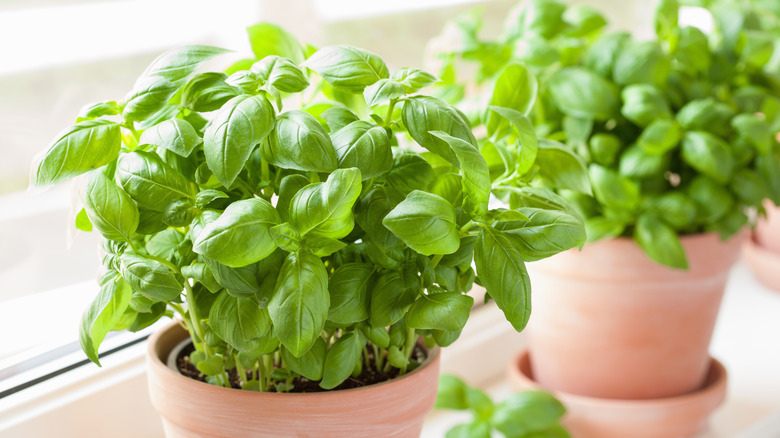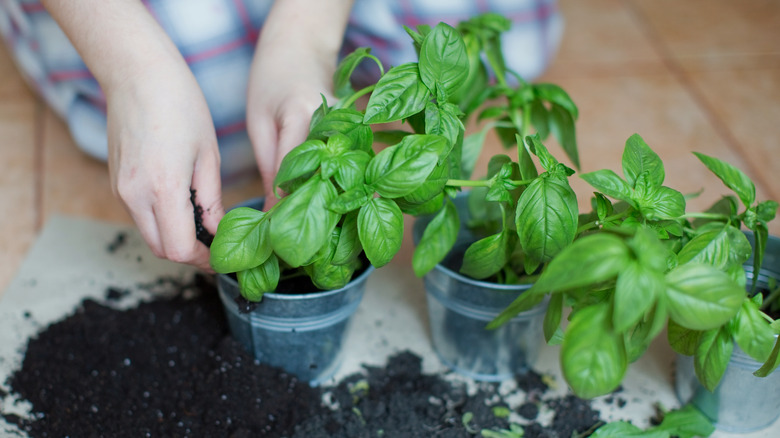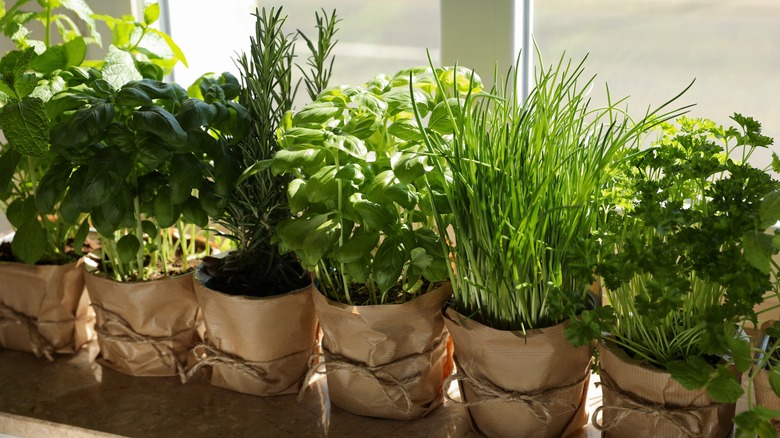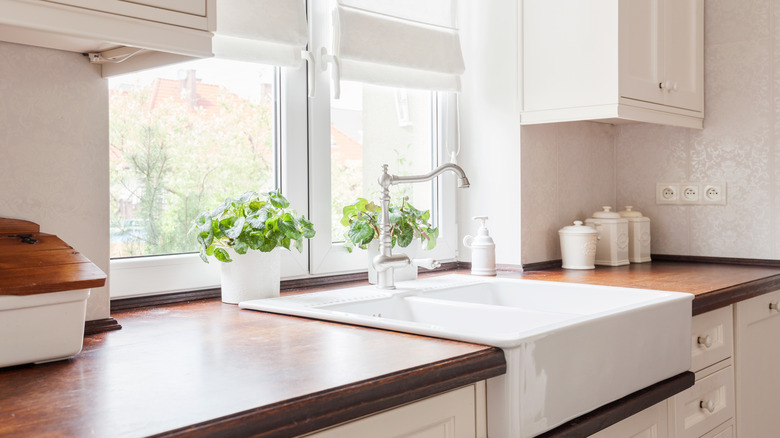The Herb You'll Want In The Kitchen To Keep Flies Out All Summer Long
There are plenty of things you can try to deter flies, however, if you grow basil in your kitchen, you may already have one of the best natural repellents in place. Basil is a tasty, fragrant herb, perfect for flavoring pasta sauces and spicing up your pesto, but it also has natural oils that will discourage flies from calling your kitchen home.
If you have a garden, you may already know that placing basil among your tomatoes will help discourage flies, aphids, and some types of beetles, and the same premise is true in your kitchen. It can also keep mosquitoes at bay, making your kitchen pest-free.
Flies hate the strong, pungent scent released from the basil leaves, and having the plant growing in problem areas should be enough to keep them out. As basil grows, the leaves expand, causing the natural oils to seep out — providing not just a pleasant fragrance for your home but one that keeps it pest-free as well.
How to grow basil in your kitchen
Basil is a hearty herb that can handle being forgotten about for a few days or tucked into a dark corner out of the sunlight for some time. It is commonly and easily grown indoors as long as you can supply it with enough sunlight and base nutrients. Most importantly, choose indoor garden soil that has nutrients added to it. Place this into a small to medium-sized pot that has a hole in the bottom to allow for easy draining. Basil needs moist but well-drained soil to do well.
Whenever possible, position the plant near the window so it gets about six hours of light each day. If you have a south-facing window, that's even better. If you don't have a lot of sunlight, you can grow basil well using fluorescent lighting, but they'll need twice as much time under this type of lighting to thrive.
You can start growing basil from seed, or purchase a seedling and give it a new home in your kitchen. Make sure to re-pot it every few months if it grows significantly — which well-cared-for basil will do. Once it starts to do well, you can pluck off the leaves to add to meals, and they'll reliably grow back. Place your basil plant near the sink, garbage can, or other areas of the room where you have fly problems.
Why does basil work to keep flies away?
For anyone that loves the fresh scent of a newly pureed batch of pesto, there's no doubt the smell of basil is an enjoyable one. This natural herb has a very strong scent, though, and while it may be a fantastic food enhancer for people, flies hate the smell of it, and so it is the scent that deters them. Flies, as well as other pests like gnats, have a strong sense of smell, and that typically helps them find food sources.
The basil doesn't necessarily hurt the flies, but the scent itself is not attractive, encouraging them to find another source of food. It works much like foul scents work on humans. Most people don't like the scent of sulfur, for example, and therefore aren't likely to stay in an area where it's strong. There's evidence that flies can detect strong odors as far as four miles away. They are attracted to decaying organic matter, which typically has a putrid smell, rather than the freshness of basil.
Flies also don't like the scent of lavender, bay leaves, rosemary, or peppermint, which makes it really easy to keep your kitchen fly-free if you plant a small herb garden on the windowsill. Each of these has a very strong, specific odor to them; one fly can pick up some distance away and know to avoid that area. Your kitchen, on the other hand, may smell fantastic!
Alternative options for using basil to repel insects
If you don't have the time or room to grow a lot of basil plants, there are a few alternative methods that can help you get the same natural results. You can purchase fresh basil leaves from the grocery store, for example, and place a few of them around your kitchen, replacing them when they lose their fragrance. You can place these leaves anywhere in your home where you have a pest problem.
Another option is to use basil extract, which is a liquid, oil-like product purchased in the seasoning aisle of many grocery stores. It carries the natural oils of basil and the same scent. Place a small amount of it on a paper towel, then place that paper towel wherever you're having a fly issue to deter flies from coming back. You can also use fresh dried basil. Older or inferior dry basil isn't likely to have a strong scent since much of the oil has evaporated, so choose a higher-quality product.
Keep in mind that using basil like this is only effective if you've done all you can to clean your kitchen and minimize moisture growth there. For the best results, properly clean your countertops, garbage cans, and even behind the toaster and under the oven, and then use basil to keep the flies out of your kitchen through the summer months.



